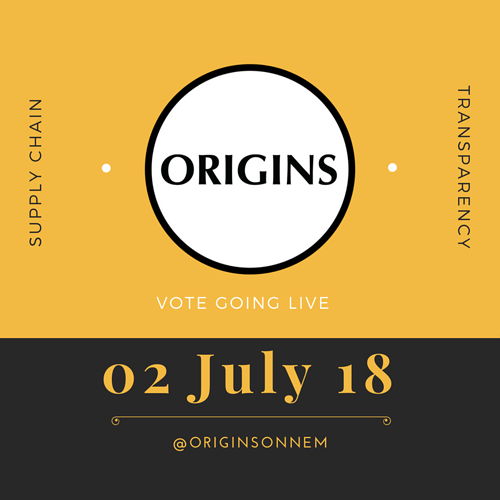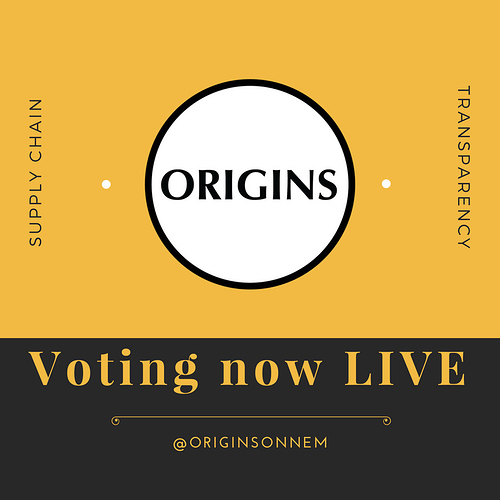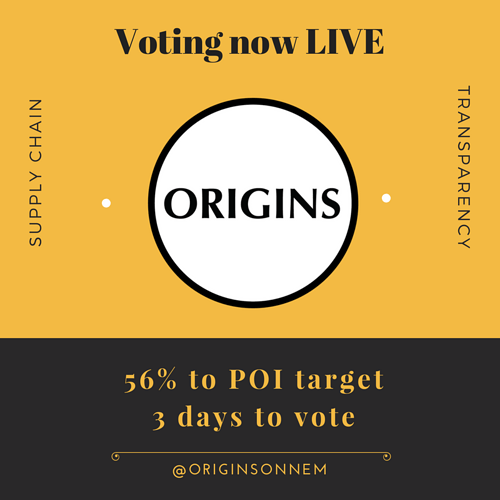Great to see a focus on clear measurement of social impact. You have my support 

Sorry I am not able to keep up with all the GOOD projects, but this looks like one.
iIll put in my small vote and hope it can make this closer to implemented.
You guys have my vote too! This looks like a great idea and use of the NEM blockchain.
Thanks @nervozaur, @xemnewbie and @Fraser_M we’re about to go live this coming Monday and we’re so happy to have your support on this journey to revolutionise the fashion industry 
I like the ideology of this project, but have some questions:
-
How do you convince a business to expose so many trade secrets? Most businesses place tremendous value on their sources and contacts. Exposing the origins and product trail to such a degree seems to be counter intuitive to any competitive business.
-
How do you actually digitally verify a non digital item such as wool? For example, a manufacture buys some high quality wool tracked with the Origins system - What measures are available to ensure they do not cut the wool with a secondary inferior supply?
-
Does Origins reduce business costs in some way? In international trade a business usually has a Bill of Laden or other government document to confirm source and quantities. If the governments themselves don’t adopt the Origins system, it would appear that this would be an added cost to businesses, as it is an additional tracking system on top of the required governmental ones.
-
What is to stop the Origins system from having similar difficulties as the Fair Trade system? Fair Trade has been under fire for some time now for actually damaging the communities they intend to help. For example, farmers in some regions were unable to be competitive with the Fair Trade system, resulting in reduced sales (and profits). A current issue, is an overabundance of Fair Trade products. Supermarkets simply cannot sell the products fast enough to keep up with supply. When supply is greater than demand, competition inevitably takes place.
Thanks for these excellent points:
-
This is an interesting one, but I see this as the way of the future. More businesses are openly sharing their supplier details as they actually see this as a point of difference and therefore competitive advantage. Icebreaker and Marks & Spencers for example have both openly shared this information and more companies are following suit. There could also be an option to share the location/data but not necessarily the contact, however in my opinion these usually aren’t considered “trade secrets” in this industry as knowing where a competitor is manufacturing is irrelevant because either you’re differentiating by brand and/or have exclusivity agreements with your manufacturer.
-
This is also a risk and not intended to be a complete solution on its own. CMT manufacturers and brands would/should still do standard testing on raw materials to verify this but a tracking solution would enable everyone to pinpoint from which source this was happening, a comprehensive system would therefore inherently reduce the risk for fraud or tampering with materials.
-
Yes and No, my business currently spends tens of thousands of dollars a year tracking and verifying the origins of our raw materials and the current systems that are available are very clunky. Brands that have been caught up in factory fires or child exploitation cases can face lawsuits and fines running into the millions.
-
Origins is aiming to track something that is already happening by providing increased visibility. I see there been low risk in inadvertently damaging communities however we have always employed local cultural advisors and worked in partnership with reputable local organisations to mitigate this risk. I see the benefits outweighing the risks but is something we’re really conscious of.
Thanks for your time to raise some really important questions. Hopefully this answers some of your concerns but would be really happy to provide more detail or discuss this further.

 Polling is now open for our proposal which we think with NEM community support we can provide a much better system for tracing garments and tracking supply chains.
Polling is now open for our proposal which we think with NEM community support we can provide a much better system for tracing garments and tracking supply chains.
Please use the poll address:
NDBKCSLUQTPY6OOWQ2ZFUABDKAVOZQS65PULDG7O
To vote YES  send 0 XEM to:
send 0 XEM to:
NCGZKE-PZSXKF-W4WCTK-3M4LHA-KNBQXT-DXK65D-CML7
To vote NO  send 0 XEM to:
send 0 XEM to:
NCNSRY-BTGVM6-JXSRXV-ZDHWDF-XFERGZ-Q5FU6D-UOID
Thanks NEM community!
Are you doing NCF for second time?
Great Project Team !
There are many times when I wished for transparency in the textile Industry. Especially at times when you get conned with fake and counterfeit products even after shelling out a lot. I believe even though that there are many blockchain projects in supply chain, the laser-sharp focus of yours just for the textile industry can be a great use case. Rooting for you guys 
@Lionheart this is the first and Little Yellow Bird has been self-funded/relied on it’s own income generation. @Nitin_Vasanth thank you, I think there’s lots of other projects we can hopefully integrate with whilst initially focusing on our specific interest area.
Glad you don’t mind my direct questions. I do see potential in this idea, but it’s the details that are important to my voting decision.
-
Is your goal to revolutionize this industry? Or more-or-less create a premium label / certification brand within the industry?
-
Is there any software development yet? And if not, is there any thought on patent-ability? What is to stop the big players in the industry from just letting you develop the proof of concept, then swooping in with their giant budgets to design and build a similar system - meanwhile using their connections to an advantage?
-
I may have missed it - Are there any developers on your team? If so, are they experienced with blockchain - NEM specifically. If not - do they still need to be sourced, or is there a person or team in mind? (Trying to better understand the development approach)
-
Why not conduct an ICO or seek Venture Capital?
-
Have you presented the idea to investors? If not - why not? If so - Any feedback of theirs that you can share?
Kia Ora Leon! More great questions:
-
Our goal at Origins is to create a trust based and transparent value supply chain so consumers and brands have increased certainty over the origins of their purchases. The Origins certification will initially be targeted at ethical and sustainable fashion companies. We see this system revolutionising this niche and providing these companies with the best systems and tools to take on some of the bigger industry competitors.
-
We’re in the early stages of development and solution architecture at present as well as establishing key partnerships both in New Zealand and overseas. If all clothing retailers created their own transparent supply chain systems we will have achieved the mission we set out on, an excellent result. From my experience to date these companies have not shown much initiative in this area, they tend to partner with those that can help them easily integrate these systems so this will be our main aim.
-
As blockchain technology is an emerging industry we’re working closely with the NEM NZ team to source the best NEM blockchain developers in the country. As you would know Leon NEM can be coded in multiple common languages so I don’t see this as a huge barrier. If you have anyone in mind that would be a good fit for this project we’d love to hear from them.
-
We’re focused on bringing to life a tangible value adding and real life use cases to blockchain technology. We’ve identified that NEM blockchain is the most suitable, out of the box, ready to go technology that aligns with our purpose. We’re building a business not an inflated idea so we don’t see either of these other options as suitable at this time. We’re aware of the 12month ICO restriction imposed with the NCF proposal, however, we don’t see this being something we’re interested in doing in the medium term.
-
We’re really engaged with the NZ social impact investment community, many of whom have been advisors and friends with Little Yellow Bird and are following this project with keen interest. Our purpose drives all our business decisions and relationships.
Thanks for your excellent questions, feel free to shout out if you want any more clarification or know of any other awesome people that would add value to this project.
2 links
- Zara (Inditex) about Traceability. Will blockchain (Origins for example) improve their actual method?
https://www.inditex.com/how-we-do-business/our-model/sourcing/traceability
2 . A guide (made in Australia) with 407 fashion brands. This guide is a companion to the 2018 Ethical Fashion
Report and seeks to empower you to purchase from companies that treat their workers ethically
https://drive.google.com/file/d/1zgrbyv1DdgDLhKhA082gVqk2tfI_5e8e/view?usp=sharing
Thanks for this, we’re familiar with both. If you have any further comments let us know 
my yes is out. looking good
Thanks @Stinghe_Dorian! @Trikar_Blockchain sorry I didn’t actually answer your question earlier, Inditex only trances to factory level. Origins is aiming to trace the raw materials right back to the source.
Just wondering, what is your specialty wool or cotton?
Both are huge industry’s, do you claim to have expertise and contacts in both sectors?
And if so how do you plan to navigate two very similar industries with very different origins?
Cheers
We have contacts in both but we are much more specialised in the cotton sector and this would be where we focus our efforts initially. Being from New Zealand wool is a valuable commodity that several big international brands here are talking with us on how the can ensure their wool sent overseas is tracked through and returned back to them but we’re much earlier along that journey. Y1 will be all about cotton.
We’re in the final stretch, thanks so much for your support to date. Please help us spread the word to create a more sustainable and transparent garment industry.
Yes
votes: 257
weighted score*: 1.76581%
percentage: 98.28
3 days left, I think you need a couple of whales to vote 



